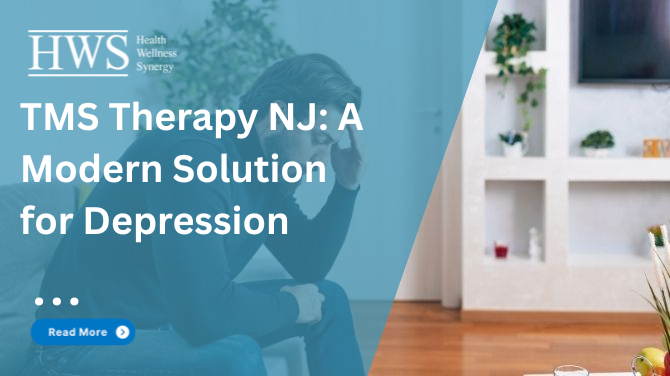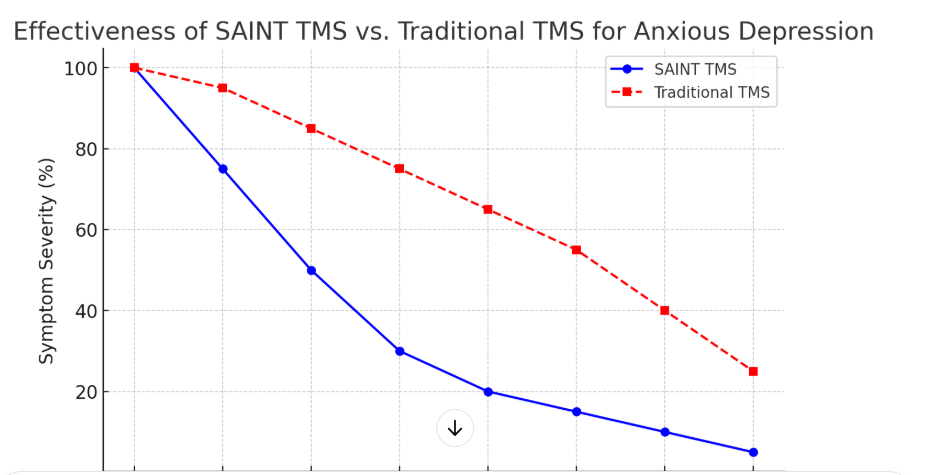
TMS is an FDA-approved, non-invasive treatment for major depressive disorder, treatment-resistant depression, and other mood disorders. It works by delivering focused magnetic fields to stimulate nerve cells in specific areas of the brain, notably the prefrontal cortex, which regulates mood.
Unlike traditional therapies such as antidepressant medications or electroconvulsive therapy, TMS is drug-free, outpatient, and associated with minimal systemic side effects—no sedation, memory loss, or weight gain.
TMS is ideal for individuals who:
Our TMS center offers new hope when other mental health treatments have failed, especially for those seeking lasting improvement without long-term medication use.

Meet with a qualified healthcare professional for a full review of your mental health history, symptoms, and prior treatments. This includes discussing your experience with antidepressant medications, any diagnoses such as major depressive disorder, bipolar disorder, or anxiety disorder, and identifying signs of treatment-resistant depression. If appropriate, we may also conduct standardized tests or a brief neuropsychological evaluation to ensure TMS is the right fit for you.
After the evaluation, we design a protocol that’s tailored to your unique mental health care needs. This plan targets specific areas of the brain, such as the prefrontal cortex, which is closely linked to mood and cognitive function. Your treatment plan considers any learning difficulties, coexisting conditions like attention-deficit/hyperactivity disorder, and overall goals to ensure an effective and focused approach.
Each TMS session involves placing a small electromagnetic coil on the scalp to deliver gentle, targeted magnetic fields that stimulate nerve cells. Sessions last 20–40 minutes, are pain-free, and require no sedation, allowing you to resume your day afterward. Most patients come in five times a week for several weeks, depending on the severity of their depressive symptoms and other mental health conditions.
We closely monitor your response throughout treatment using digital tools and our secure patient portal. Progress is measured through patient feedback, mood assessments, and improvements in daily activities and academic performance (for younger patients or school-aged children). Your treatment plan is adjusted as needed to ensure optimal outcomes, while our team provides continued support and related services to help you return to a more balanced, productive life.
At our New Jersey clinic, experienced and licensed TMS providers deliver personalized care for treatment-resistant depression, anxiety, and other mood disorders. We offer seamless integration with most insurance plans, along with transparent billing and flexible scheduling. With convenient access across the state, patients receive results-driven mental health treatment tailored to their needs. By combining TMS with therapy, lifestyle support, and follow-up, we help achieve significant improvements without the systemic side effects of medication.

Clinical trials show high success rates, especially for treatment-resistant depression. Many patients report relief after just a few weeks, including improvements in:
And because TMS does not affect your systemic biology, side effects are generally limited to mild discomfort, such as slight tingling or scalp sensitivity.
If you’ve been searching for a proven, non-invasive solution to regain control over your mental health, TMS Therapy in NJ could be the breakthrough you’ve been waiting for. Backed by science and delivered with compassion, our approach is tailored to your unique needs, so you’re never just a number. Don’t settle for temporary fixes or one-size-fits-all effective treatment.
Take the first step toward long-term relief and emotional clarity. Contact us today to schedule your free consultation and start your path to feeling like yourself again.
TMS is an innovative form of depression treatment that offers hope when other options haven’t delivered the results you need.
Schedule a consultation! Provide your contact information below and we’ll get back to you as soon as we can.
Transcranial Magnetic Stimulation (TMS) therapy uses focused magnetic energy to stimulate brain regions involved in mood regulation, particularly those underactive in depression. This FDA-approved treatment helps restore healthy brain activity and is highly effective for individuals who haven’t found relief with prior antidepressant medication.
TMS is widely used for major depressive disorder, but research also supports its use for anxiety disorder, obsessive-compulsive disorder, and Post-Traumatic Stress Disorder. It is now being explored as a supportive option for attention-deficit/hyperactivity disorder and learning difficulties when these conditions are linked to disrupted brain activity in the prefrontal cortex. While TMS is not a cure-all, it’s an important tool in a comprehensive mental health strategy.
Many patients begin to see changes within 1–2 weeks of starting treatment session, especially in areas like daily activities, emotional regulation, and energy. However, full neuropsychological evaluation and tracking over 4–6 weeks offer the most accurate diagnosis of TMS effectiveness. Improvements are often cumulative, building steadily over the full treatment protocol.
Many of our treatment programs are covered by insurance. Contact your insurance provider to verify benefits for mental health care.
We currently accept the following insurance plans:
Other insurance plans are in progress.
Self-pay plans would be discussed on an individual basis.
TMS is a non-invasive procedure with an excellent safety profile. It does not require anesthesia or medication, so patients avoid typical systemic side effects such as weight gain, fatigue, or memory impairment. Sessions are delivered by trained healthcare professionals, and data collection during therapy helps fine-tune the treatment plan for each individual’s unique needs.
Unlike antidepressant medications that affect the whole body and often cause side effects like sleep disruption or weight gain, TMS targets a specific area of the brain areas associated with mood and cognitive processing. This precise approach allows for mood improvement without interfering with language skills, executive function, or other core cognitive processes. TMS is ideal for those seeking an alternative treatment option that doesn’t interfere with day-to-day function or learning.
Yes, TMS is increasingly used for anxiety disorders and even as an off-label option for chronic pain. By targeting specific neural circuits, it can reduce symptoms of Post-Traumatic Stress Disorder and Traumatic Stress Disorder, while improving emotional regulation and overall comfort in daily life.
All sessions are administered by trained TMS technicians under the supervision of a board-certified healthcare provider. You’re in expert hands throughout the typical treatment course, ensuring safety, precision, and support.
Absolutely. TMS is a non-invasive treatment, so there’s no recovery time required. After each TMS session, most patients return immediately to work, errands, or other normal activities with no disruption to their day.
We use cookies to improve your experience on our site. By using our site, you consent to cookies.
Manage your cookie preferences below:
Essential cookies enable basic functions and are necessary for the proper function of the website.
Google reCAPTCHA helps protect websites from spam and abuse by verifying user interactions through challenges.
Google Tag Manager simplifies the management of marketing tags on your website without code changes.
You can find more information in our Cookie Policy and Privacy Policy.